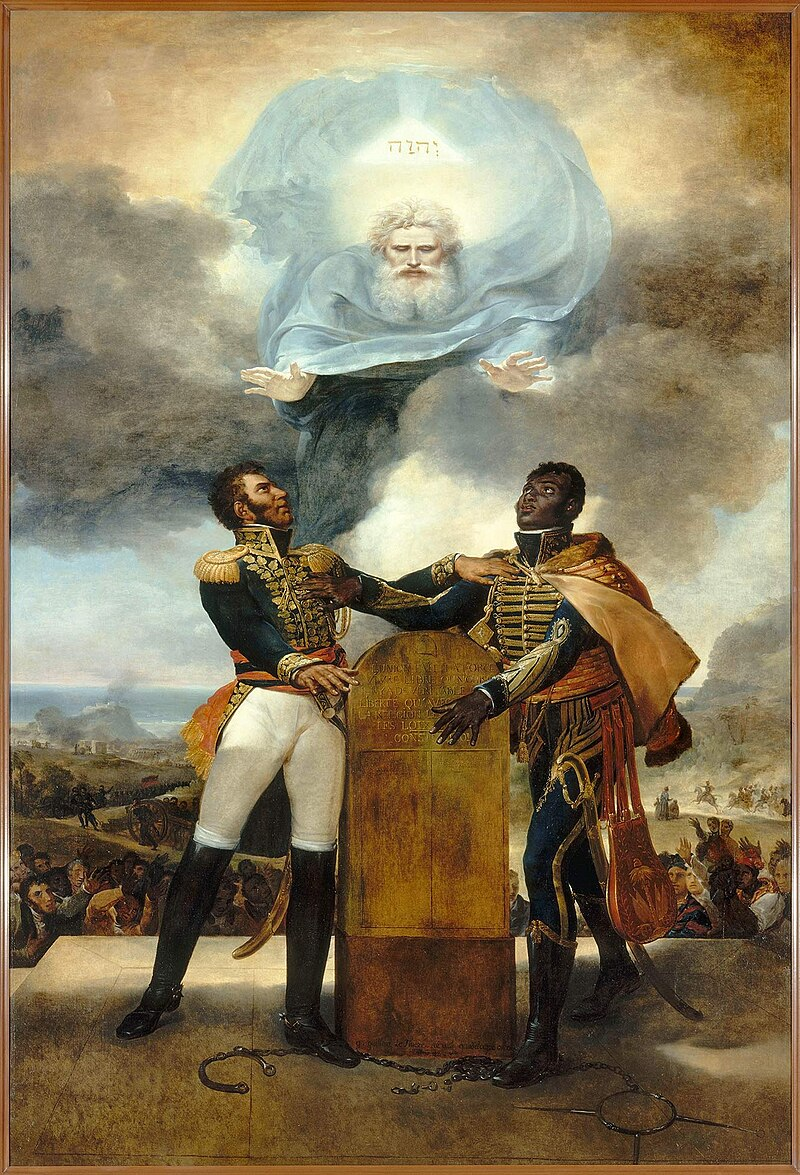Painting: The Oath of the Ancestors JJ is on the right
(c. 1758-1806), former slave, general in the Haitian Revolution, first leader of independent Haiti, and a lwa in the Haitian Vodou pantheon. The specifics of Jean-Jacques Dessalines’s early life are not well documented and historians have not come to a consensus regarding his date and place of birth. He was born around the year 1758 in either west-central Africa or in the Grande Rivière region in the north of the French colony of Saint-Domingue in the Caribbean, where he spent much of his life as a slave on two plantations. In the late eighteenth century, Saint-Domingue was the most wealth-producing colony in the Americas. Much of this wealth was generated through the cultivation and export of sugar and coffee crops. Enslaved people, often purchased by the plantation owners through the transatlantic slave trade, were forced to work on plantations to produce wealth for their masters. Some enslaved people were born in the colony, but the violence inherent in the labor system meant that the laboring population could not be sustained by natural growth and therefore a majority of the slave population in Saint-Domingue was African-born.
Dessalines worked on the Duclos sugar plantation in Cormier for most of his enslaved life and was subjected to excessive violence and brutal discipline by his notoriously cruel white master. He bore the deep scars of his enslavement until his death. On the Duclos plantation, he attained the position of foreman and was eventually sold to a free black master builder named Des Salines. The fact that he kept his second master’s last name, even after the abolition of slavery, suggests that he maintained a better relationship with Des Salines than his first master.
The Revolution
Dessalines’s whereabouts during the first years of the Haitian Revolution are unknown. By 1793, however, it is clear that he was a member of the revolutionary army under the leadership of Toussaint Louverture. He enters the historic record through his promotion to captain as a reward for his gallantry in battle. This same year, the French agents Léger Félicité Sonthonax and Étienne Polverel proclaimed the abolition of slavery in the colony. The French Assemblé Nationale ratified this decision and applied it to the entire French Empire in 1794.
During the Haitian Revolution, Saint-Domingue had become a battleground for the inter-imperial war raging throughout the Atlantic. Louverture and his army gained prominence in the French Republican army as they fought against the Spanish forces that were encroaching from the east and British forces that occupied the southern and western departments of the colony. Former slaves and free people of color fought on all three sides during these battles as they jockeyed for their own personal advantage and interests. During these conflicts, Dessalines secured the position of colonel of the Fourth Regiment in Louverture’s army in 1795. That same year, the Spanish army left the island as a result of the Treaty of Basel in which the eastern side of Hispaniola, formerly the Spanish colony of Santo Domingo, was ceded to the French. The British evacuated the south in 1798. These conflicts, however, had lasting results, and even after the international wars ended, internal divisions still remained.
Louverture’s military victories won him significant power and political authority in the colony, but he struggled for control with the agents that the French metropolitan government sent to the colony. One of the key conflicts occurred between Louverture and the French agent Joseph d’Hédouville. For a brief amount of time, their interests overlapped and they were able to collaborate; it soon became clear to Louverture, however, that Hédouville was his primary competition. After the evacuation of the British, Dessalines assumed command of the region of St. Marc and from there he marched toward Cap-Français to arrest Hédouville. Hédouville was in the process of trying to escape a rebellion under the command of General Moyse Louverture. Moyse had a close relationship with his adoptive “uncle” Toussaint Louverture, but he and his followers also disagreed with some of Louverture’s policies, notably Louverture and Hédouville’s labor laws, which had been enacted in an attempt to revive the colony’s sugar and coffee plantations. Whereas Louverture and Hédouville believed that the war and the colony were not sustainable without agricultural production, Moyse supported small-scale farming and land distribution. Moyse was executed by Louverture for his act of rebellion, but Dessalines was not able to capture Hédouville and, as he fled the colony, Hédouville surrendered his power to Louverture’s rival, André Rigaud, the commander of military forces in the south.
The rivalry between Louverture and Rigaud was ingrained with conflicts based on socioracial status and skin color; Louverture represented a darker-skinned army and Rigaud one of mixed racial heritage. The conflict, however, was based on not only skin color but also political divisions. In 1799 Louverture sent Dessalines to subdue Rigaud’s separatist movement. In March 1800, in a key battle of the War of the South, as it became known, Dessalines and Louverture along with Henry Christophe gathered their vastly larger forces and defeated Rigaud and Alexandre Pétion’s forces at the city of Jacmel. The fighting continued, but Rigaud and his leading generals eventually evacuated the city of Les Cayes in August 1800, enabling Louverture to secure it. Following these battles, Dessalines’s fiancée Marie Félicité Claire Heureuse Bonheur served as a nurse and encouraged him to show mercy to the injured soldiers of Rigaud’s defeated army. Claire Heureuse was likely the daughter of a poor free black couple from Léogane. On 21 October 1801 she married Dessalines in Léogane and the wedding celebration continued for three days. Dessalines is believed to have been a passionate dancer. At the time of their wedding, Dessalines had at least four children with at least one other woman.
Once Louverture assumed the sole leadership role in the colony, he, along with Dessalines and Moyse, attempted to force the population to return to plantation labor. They viewed the export economy as the only way to sustain relative autonomy from France and to secure manufactured goods, most importantly, war materials. Dessalines was in charge of the southern and western departments and used violence or the threat of violence to coerce the laborers to assume the same jobs that they had been forced to work as slaves. This strategy may have been a tactic to appease French anxieties over the lack of productivity in the colony and to assure the metropole that the system could continue as it had previously. This was because Louverture was advocating for greater autonomy, but at the same time he did not want to anger the French government. Louverture issued a constitution in 1801 that professed continued allegiance to France but also declared autonomous government in Saint-Domingue. This document challenged the authority of Napoléon Bonaparte in France and, as a result, Bonaparte began to coordinate a military campaign to regain control of the colony. He sent a force of 30,000 men under the direction of his brother-in-law Charles Victor Emmanuel Leclerc to Saint-Domingue to disarm the “rebel” army. The army arrived in early 1802, and rumors that Bonaparte and Leclerc planned to reintroduce slavery in the colony sparked massive resistance there. A series of defeats led Christophe, Louverture, and Dessalines to surrender to the French, but widespread resistance continued. Leclerc distrusted Louverture and had him deported to France, where he would die in 1803 in a prison at Fort-de-Joux in the Jura mountains.
Christophe, Dessalines, and a number of other commanders in the colonial armies then fought alongside Leclerc to subdue the resistance and to disarm the population. It quickly became clear to these native leaders, however, that their visions for the colony differed significantly from the goals of the Leclerc expedition. They defected and rejoined the rebel camp. Louverture’s absence in the colony paved the way for Dessalines to assume the military rank of general-in-chief in what he began to call the “Indigenous Army.” The perceived threat to universal liberty in Saint-Domingue quickly turned the revolution into a war for independence. This was an all-out war. It was characterized by extreme violence on both sides since both armies assumed that the only solution was the complete eradication of the opposing forces. Leclerc argued that the only way to make Saint-Domingue productive again was to kill the entire population and to start fresh with enslaved captives from Africa.
Dessalines’s army, aided by a bout of yellow fever that ravaged the French army, gained the upper hand. In mid-1803 Dessalines began to plan for independence. The final battled occurred outside the city of Cap-Français at Vertières, and on 29 November 1803 Dessalines signed a peace treaty with Leclerc’s successor, Donatien Marie Joseph Rochambeau, calling for the evacuation of the French army. The treaty provided for the safe evacuation of the French army and any French planters who wished to leave. It also guaranteed the security of those planters who wished to stay. Louverture had previously promised the safety of white plantation owners if they wished to return to their former plantations and Dessalines’s assurances appeared to be mirroring such a strategy. He did not keep this promise, however, and many of these white French plantation owners were killed on Dessalines’s orders.
Independence
A month after the evacuation of the French, on 1 January 1804, Dessalines gathered his generals at Gonaïves and gave a speech that declared the island’s independence from France. This speech was soon published as being addressed to the “citizens of Haiti.” In this proclamation, Dessalines swore “eternal hatred to the French” but promised not to intervene in the affairs of the other empires of the Atlantic. At the time, Dessalines was courting the governments of Britain, Spain, and the United States in an attempt to secure recognition of the island’s independence from France as well as to find trading partners. This recognition was not forthcoming. Dessalines’s speech represents the world’s second successful declaration of independence to form a lasting nation-state, after the United States, and it also created the second independent nation in the Americas. On the same day, Dessalines was named governor-general for life of “Hayti.” This proclamation emphasized the many ways that the French influence could still be felt in the new country and highlighted the need for Haitians to prepare for battle. This call to arms resulted in a series of violent and public massacres of the remaining white French citizens on the island between February and April 1804. A small number of skilled individuals were spared for their perceived usefulness to the new country and British and American merchants were protected. In describing these massacres, Dessalines declared, “I have avenged America.”
In November 1804 Dessalines proclaimed himself Emperor Jacques I of Hayti, but he did not publish a national constitution until 1805. This constitution renewed the law that prohibited slavery and undertook to regulate the social, legal, and commercial structure of the country. Dessalines assumed complete control of the governance and military leadership of the country and ruled Haiti in an authoritarian manner. The 1805 constitution declared that all Haitians were citizens of the same family and were to be considered “black.” This designation was an attempt to eliminate the socio-racial hierarchies that had carried over from the colonial period. Despite efforts like this, Dessalines’s rule, in fact, had a lot in common with the colonial period and many former slaves were forced to go back to plantation labor and once more worked the land for the benefit of others.
By late 1806 Dessalines’s authoritarian rule had inspired resistance among the leading generals of the army, who organized a plot for his overthrow. On 17 October 1806 Dessalines was assassinated by a group of rebels near Pont Rouge just outside of Port-au-Prince. He was shot and his body torn to pieces and paraded through the city. Following Dessalines’s death, a battle for national leadership ensued between the generals Henry Christophe and Alexandre Pétion. Christophe was elected to office under a new constitution in 1806, but he did not agree with the republican style of government. He and his supporters retreated to the north and published a new constitution in 1807. The country split in civil war and Pétion was elected president of the Republic of Haiti in the southern and western departments. For the next decade, the country existed under the two governments of Haiti in a civil war stalemate, which sometimes flared up into outright war.
While the Haitian government had declared independence in 1804, the French government did not immediately acknowledge its defeat and waited until 1825 to extend official diplomatic recognition to Haiti. And, even after such a long time, the French only did so in exchange for an enormous indemnity payment from the Haitian government to compensate the former plantation owners who had lost their human and territorial property during the revolution. The British, Dutch, and Danish empires implicitly recognized Haitian independence in 1826 when they sent consuls to the island, but the United States waited until 1862 to recognize Haiti’s independence. While all of these governments withheld official diplomatic recognition after the Haitian declaration of independence, merchants traded with Haiti, legally and illegally, and helped to support the island’s independence from France.
Following his death, Dessalines was incorporated into the Vodou pantheon as “Ogoun Desalin.” The figure of Ogoun in Haitian Vodou is the innovation of a syncretic amalgamation of the Catholic Saint Jacques and the African warrior spirit Ogoun. Dessalines is the only leader of Haiti to have been named to the Vodou pantheon, and this highlights his continued importance in Haiti’s history.
Megathreads and spaces to hang out:
- 📀 Come listen to music and Watch movies with your fellow Hexbears nerd, in Cy.tube
- 🔥 Read and talk about a current topics in the News Megathread
- ⚔ Come talk in the New Weekly PoC thread
- ✨ Talk with fellow Trans comrades in the New Weekly Trans thread
- 👊 Share your gains and goals with your comrades in the New Weekly Improvement thread
reminders:
- 💚 You nerds can join specific comms to see posts about all sorts of topics
- 💙 Hexbear’s algorithm prioritizes comments over upbears
- 💜 Sorting by new you nerd
- 🌈 If you ever want to make your own megathread, you can reserve a spot here nerd
- 🐶 Join the unofficial Hexbear-adjacent Mastodon instance toots.matapacos.dog
Links To Resources (Aid and Theory):
Aid:
Theory:










